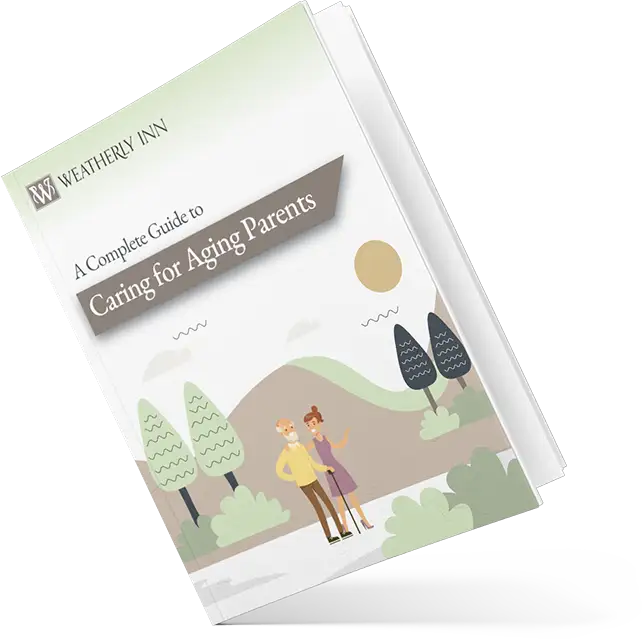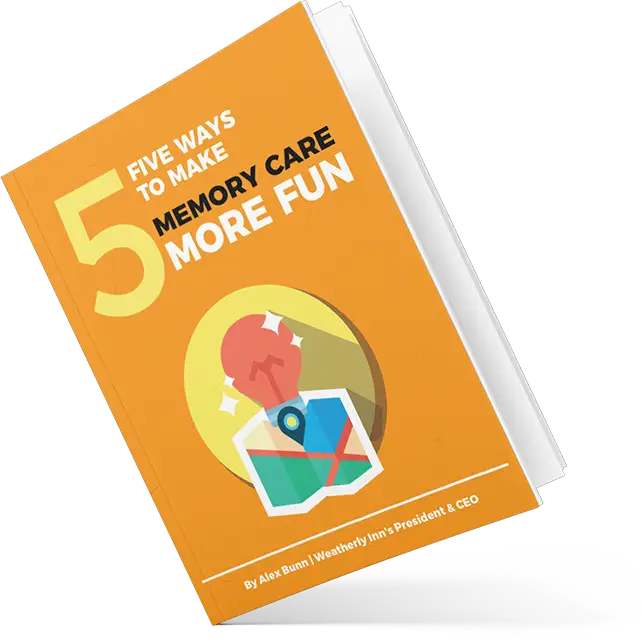December 19, 2019
Americans are living longer than they used to, which is terrific news! Everyone wants to live a long, healthy life and stay independent for as long as possible.
With this increased longevity, though, comes increased costs of living, medical care, a potential need for skilled nursing, and, invariably, inflation. Maybe you’re reading this blog right now because you want to understand long-term care for your senior family member or yourself. We’re glad you’re thinking ahead about long-term care for older adults.
At Weatherly Inn, we provide assisted living, senior living, and memory care communities. With this article, we’re going to cover long-term care for seniors, as it relates to our elderly loved ones living in a senior living community or at home with residential care. We’ll also discuss long-term care insurance and some other vital points you should be aware of while planning your loved one’s golden years (or yours).
On Aging in Place
Aging in place is probably the number one way to reduce the stress that comes with the aging process. It’s not a new concept. When most people think of the term “aging in place,” they tend to think strictly of a home environment. We want to adjust, or perhaps expand, your thinking about that as just a little.
As the aging population grows, so have options for families and caregivers. Individuals who’d like to age-in-place at home can do so more successfully, and longer than ever before. This is thanks to newer, innovative concepts in elder care like respite care and adult daycare.
Everyone feels most comfortable at home (no major revelation there!) Seniors, in particular, may be reluctant to leave a home they’ve known for a long time. It’s crucial that your loved one feels anchored to their place of residence, and they feel “at home.” However, as the challenges of aging begin to manifest, it’s not always best to leave your family member alone in their own home. That’s when we turn to long-term care communities for seniors.
Aging at home isn’t always the best choice. It might be the ultimate reality that your family member needs more dedicated care at a real nursing home or assisted living community. And if you’re wondering what the right choice for your loved one is, keep reading, we’ll cover that.
If your parent is reluctant to talk about leaving their home, and you need help talking to them, check out our article on this topic.
- Whether you choose to bring your loved one home to live with you, find the nursing staff to help, or find arrangements in a senior care community, know that a sense of stability and solid social relationships are incredibly important to your loved one.
- No matter where your parent lives, they will be “aging in place!” Your goal is to choose the best place with the best type of care that your loved one needs.
Ultimately, you’ll need to review your long-term care options to decide.
What Is Senior Long-Term Care?
The phrase long-term care is vague and complex. It covers many of the services your aging family member will need over the years.
The US Department of Health and Human Services Institute’s National Institute on Aging says: “Long-term care involves a variety of services designed to meet a person’s health or personal care needs during a short or long period. These services help people live as independently and safely as possible when they can no longer perform everyday activities on their own.”
Defining “Everyday Activities” or “Activities of Daily Living”
We all face unique challenges as we age. We may lose some of our vision and hearing, have difficulty driving or making a fast decision, or struggle with strenuous physical tasks. The term “everyday activities” however, specifically applies to personal care activities like:
- dressing/undressing
- bathing alone
- eating/drinking
- medication management
Not being able to hear a telephone ring, or see the fine print of an insurance policy, don’t qualify as a problem with everyday activities. Rather, an inability to get dressed, manage medications alone, eat independently and bathe unaided are the daily tasks we’re talking about.
If you’re trying to decide if a long-term care community is the right choice, consider those issues! If your family member needs constant help with one or more of those daily tasks, it’s probably time to think about new living arrangements at a long-term care community. Family caregivers have great intentions, but possibly not enough training or strength.
Financial Decisions for Long-Term Care – Cost of Care
Let’s not beat around the bush here. Long term care isn’t cheap in the United States. But you wouldn’t want it to be cheap! When considering the best care communities for your family member, choose the best one you can afford. You’ll sleep better at night knowing you’re doing the very best you can to care for your loved one!
Long Term Care Planning and Finances
Long-term care can be paid for privately (also called out-of-pocket), or by life insurance, or health insurance. Many situations involve both types of funding. Every family will need to make their own financial choices, and we have professionals on staff who can help you understand your options, so contact us today.
- Check out our senior living financial comparison planner tool. Just plug in your name and email address, and we’ll send it to you (and we will, of course, keep your name private).
It’s also important to understand that long-term care isn’t only for seniors! Per Seniorliving.org:
- 43% of individuals requiring long-term care are younger than 65.
- The majority of long-term care recipients are older, though, and roughly a projected seven out of ten people over the age of 65 require some form of long-term care services.
- By the time an individual turns 75, there’s a 50% chance they’ll need long-term care.
If you’re planning for yourself, as a payer, not just for a senior family member right now, look into long-term care insurance.
What Is Long-Term Care Insurance?
According to Washington State’s Office of the Insurance Commissioner: “Long-term care insurance provides benefits for a wide range of medical, personal and social services for [older adults] with prolonged illnesses or disabilities that require help with daily activities.”
Long-term care insurance is meant to boost our family member’s quality of life, and may pay these types of care:
- home health care
- other care providers
- health services and health care needs
- adult daycare
- nursing home care
- independent living
- various other care plans and group living arrangements
Is Long-Term Care Insurance a Good Choice for You or Your Family Member?
We’ve paraphrased Washington’s consumer guide to buying long-term care insurance. You can also read the full document here.
Long-term care insurance may be right for you if:
- You have considerable assets to protect, such as a home, rental properties, or other investments.
- You’re sure you can afford the premium now and for years to come.
- You’re healthy today, not seriously ill or disabled.
- You won’t qualify for Medicaid.
- You want to protect your family from providing you with long-term care in the future.
It may not be the right choice for you if:
- You have few assets or don’t own a home
- You can’t afford the premiums now, or suspect you won’t be able to in the future
- You qualify for Medicaid programs or Medicare
- You have other insurance that would cover long-term care (sometimes available on life insurance policies, it’s called a long-term care rider)
- You have no family or organizations you’d like to inherit your assets
One of the most well-known long-term care providers is AARP. Insurance prices and products change often, so contact them directly for a quote.
Older people with cognitive impairment, Alzheimer’s disease, or mental health situations are generally all covered by long-term care insurance in elder care retirement communities.
You should also be aware that long-term care insurance in Washington won’t cover treatments for drug or alcohol abuse. This varies from state to state and could change. If you have questions about your long-term care insurance or a life insurance rider, you should talk to a licensed insurance agent.
Washington’s Long-Term Care Trust Act
The Long-Term Care Trust Act will pay benefits of up to $36,500 for those who need assistance with regular daily activities such as eating, bathing, or help with medications. But it’s important to note this is not universal. Who is eligible?
- Washington residents over age 18 who have paid the payroll tax for ten years without interruption for five consecutive years
- Or residents who have paid in for three of the last six years, and who work at least 500 hours a year
The good news for Washington State residents? The state is the first in the nation to pass a bill explicitly aimed to improve long-term care. The Long-Term Care Trust Act will pay benefits for those who need assistance with regular daily activities such as eating, bathing, or help with medications.
Our Role
Our goal at Weatherly Inn is to provide the best in senior care services. Whether you have questions about long-term care, memory care, assisted living, or respite care, we hope you’ll schedule a tour with us today!
Related Reading and Resources:



